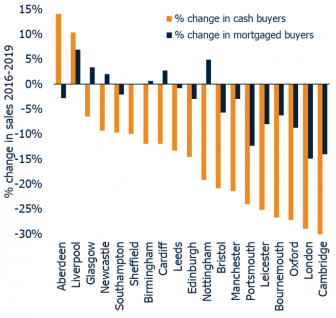The number of cash buyers has declined in most UK cities since the additional Stamp Duty rate was introduced in 2016, Zoopla said.
Most of the drops were in cities with the highest capital values and lowest yields encompassing London and southern cities, Zoopla said.
The declines since 2016 have ranged from 10% in Southampton to 30% in Cambridge.
Cities that have been favoured by investors in the past three years, such as Birmingham and Manchester, have seen cash buyers decrease by 12% and 21% respectively.
Only Aberdeen and Liverpool have seen an increase in cash buyers since 2016, up 14% and 10% respectively, which Zoopla said was helped by low pricing.
In contrast, Zoopla highlighted UK Finance data that shows mortgage approvals are on the rise.
Zoopla’s analysis of prices in the UK’s top 20 cities found that annual growth in the fastest growing city last month – a 4.8% increase in Leicester – fell below 5% for the first time since 2012.
Prices were up 1.9% annually overall.
There was better hope for the previously lacklustre London market.
Zoopla found 9.7% of listings in the capital have had their price reduced – the lowest level for three years.
The portal said this is evidence that the repricing process is close to running its course.
Richard Donnell, research and insight director at Zoopla, said: “The housing market is throwing off mixed signals as the headline rate of price growth slows yet demand from home-owners using a mortgage continues to increase.
“This is at a time when Brexit is dominating the headlines again and further complicating the outlook.
“Despite increased uncertainty, demand from mortgaged home-owners appears resilient, with demand supported by low mortgage rates, high levels of employment, and households who want a home.
“A change in the mix of buyers has impacted the demand for housing across cities since 2016. The reduction in cash buyers has been marked in southern cities and we believe this is down to a decline in investment-buying across high value cities.
“This has compounded the slowdown in price rises, which we see as a return to a more sustainable pace of price growth rather than an impending re-correction.
“The London market continues to see greater realism in pricing and there are signs of a modest increase in market activity. This isn’t a precursor to price rises, but we do expect sales volumes to start rising once again.”



Just Perhaps abolition of S21 in significantly affecting investors add to this the lunatic proposals of labours John McDonnell to give Tenants the right to buy private rented sector properties at a discount Labour will set (unknown level) and rent caps and a pile of other anti landlord policies and you have a definate reason why to invest in residential property is now NOT THE THING TO DO.
You must be logged in to like or dislike this comments.
Click to login
Don't have an account? Click here to register
Strange findings… surely cash buyers are the least affected by SDLT?
You must be logged in to like or dislike this comments.
Click to login
Don't have an account? Click here to register
Many “cash” purchasers are developers/investors, who get the worse end of the stamp reform. Having said that, I’d be interested to see what is defined as cash in these figures……. Refinances of background properties to buy new ones, and bridging finance are often classed as “cash” purchases, but still rely on mortgage finance to fund the purchase.
You must be logged in to like or dislike this comments.
Click to login
Don't have an account? Click here to register